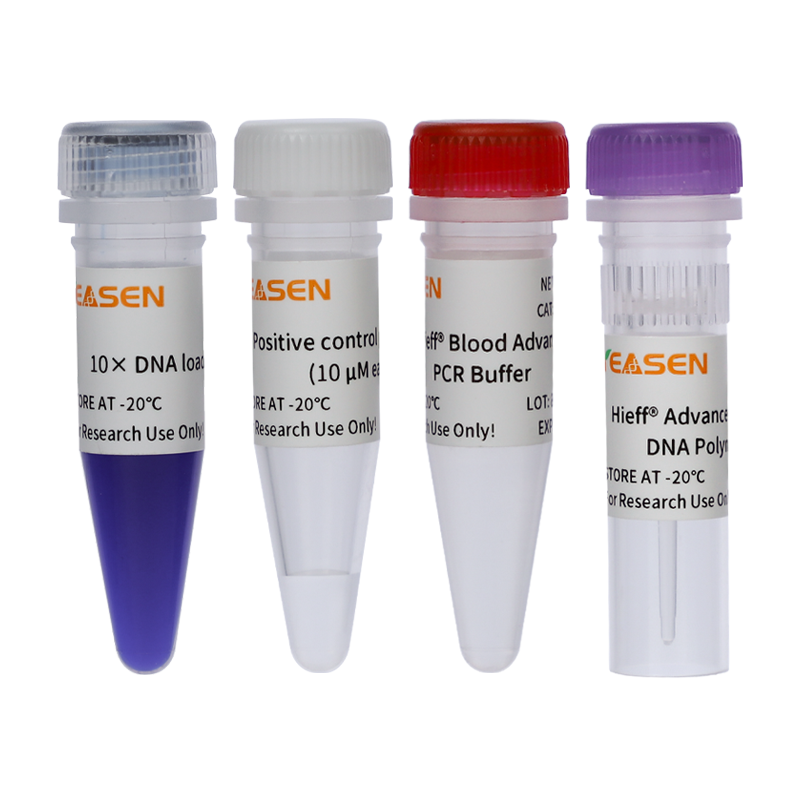Description
The Hieff® Blood Advanced Direct PCR Kit is a kit that can directly amplify whole blood samples without DNA purification or sample pretreatment, and is compatible with fresh blood, chilled (frozen) blood, and commercial dried blood stains containing conventional anticoagulants such as EDTA, heparin, citrate, etc. The kit contains a genetically engineered DNA polymerase combination with high fidelity and resistance to PCR inhibitors, 2× Hieff® Blood Advanced PCR Buffer with strong elongation factor, amplification enhancement factor, and optimized buffer system to efficiently amplify 8 kb of genomic fragments under rapid extension conditions, and set 3-5 sec/kb extension time for fragments below 2 kb, thereby significantly shortening the time for blood sample identification and testing.
Specifications
| Fidelity (vs. Taq) | 1 × |
| Hot Start | Yes |
| Overhang | 3'-A |
| Polymerase | Taq DNA Polymerase (Cat: 10726) |
Components
|
No. |
Name |
10188ES20 |
10188ES60 |
|
10188-A |
2× Hieff® Blood Advanced PCR Buffer |
500 μL |
2.5 mL |
|
10188-B |
Hieff® Advanced High-Fidelity DNA Polymerase Mix |
20 μL |
100 μL |
|
10188-C |
Positive control primer mix (10 μM each) |
100 μL |
200 μL |
|
10188-D |
10× DNA loading buffer |
1 mL |
1 mL |
Instructions
Recommended PCR reaction systems.
|
Components |
Volume(μL) |
|
ddH2O |
to 50 μL |
|
2× Hieff® Blood Advanced PCR Buffer |
25 μL |
|
Forward Primer (10 μM) |
2 μL |
|
Reverse Primer (10 μM) |
2 μL |
|
Hieff® Advanced High-Fidelity DNA Polymerase Mix |
1 μL |
|
Blood sample |
X |
2. A final concentration of 0.4 μM per primer is recommended, too high will result in non-specific amplification.
3. The optimal whole blood template concentration ranges from 0.5% to 20%, and the recommended use is 10% as the initial trial condition, that is, 5 μL of whole blood is added as a template to the 50 μL reaction system, taking care to avoid aspirating blood clots. For dried blood stains stored on Whatman® filter cards, approximately 1 mm2 of round pieces of paper with blood stains can be taken and amplified directly into the PCR reaction without pretreatment.
Reaction program
|
Cycle step |
Temp. |
Time |
Cycles |
|
Initial denaturation |
95℃ |
5 min |
1 |
|
Denaturation |
95℃ |
15 sec |
30-35 |
|
Annealing |
60℃ |
15 sec |
|
|
Extension |
72℃ |
3-10 sec/kb |
|
|
Final extension |
72℃ |
5 min |
1 |
The annealing temperature is a generic Tm value or 1-2°C below the primer Tm value. If the amplification product is less specific, an annealing temperature gradient can be established to find optimal annealing conditions.
Extension time of 10 sec/kb can amplify most of the target fragments below 8 kb, and 3-5 sec/kb can amplify most fragments below 2 kb. If the amplification efficiency is low, the time can be appropriately extended to 20-30 sec/kb, and should not exceed 60 sec/kb.
Shipping and Storage
The products should be stored at -15℃ ~ -25℃ for 1 year
Figures

Notes
1. It is recommended that the blood template be used as 10% of the total reaction volume, that is, 5 μL of whole blood is added to the 50 μL reaction system as the template, taking care to avoid aspirating blood clots.
2. Extension time of 10 sec/kb can amplify most of the target fragments below 8 KB, and 3-5 sec/kb can amplify most of the fragments below 2 KB. If the amplification efficiency is low, the time can be extended to 30 sec/kb.
3. After the PCR reaction, it is recommended to centrifuge the reaction product at 4000 rpm (1000× g) for 1-3 min to precipitate blood cell fragments, and take the supernatant for downstream analysis.
4. This product cannot be directly used for medical diagnosis.
5. For your safety and health, please wear a lab coat and wear disposable gloves.
Payment & Security
Your payment information is processed securely. We do not store credit card details nor have access to your credit card information.
Inquiry
You may also like
FAQ
The product is for research purposes only and is not intended for therapeutic or diagnostic use in humans or animals. Products and content are protected by patents, trademarks, and copyrights owned by Yeasen Biotechnology. Trademark symbols indicate the country of origin, not necessarily registration in all regions.
Certain applications may require additional third-party intellectual property rights.
Yeasen is dedicated to ethical science, believing our research should address critical questions while ensuring safety and ethical standards.

